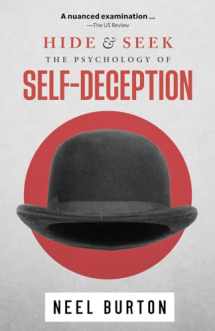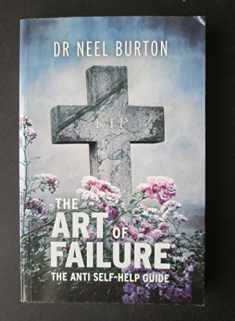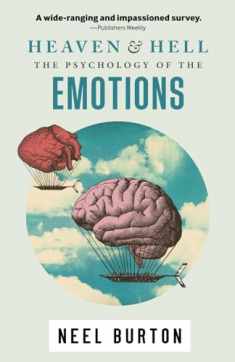
Hide and Seek: The Psychology of Self-Deception (Ataraxia)
Book details
Summary
Description
Review
Burton provides an excellent explanation of how we use psychological defence mechanisms to protect ourselves from painful truths. --The Psychiatrist
Burton guides the reader to unlearn, rediscover, and return to wholeness. It is a journey out of Plato's cave... --The International Review of Books
Burton is never short of an interesting and sharp judgment. --Prof Peter Toohey, Psychology Today
Burton's writing blends deep knowledge of his subject with lively anecdote and a genuine concern for how we might draw on the insights of psychology and philosophy to live a better life. Highly recommended! --Gareth Southwell, philosopher and writer
I've read many Neel Burton books. He's a wonderful writer and able to immerse you lightly in pretty heavy stuff. --Adrian Bailey, Vine Voice
Start seeing things you never saw.
Self-deception is common and universal, and the cause of most human tragedies. Of course, the science of self-deception can help us to live better and get more out of life. But it can also cast a murky light on human nature and the human condition, for example, on such exclusively human phenomena as anger, depression, fear, pity, pride, dream making, love making, and god making, not to forget age-old philosophical problems such as selfhood, virtue, happiness, and the good life. Nothing, in the end, could possibly be more important.
◆ Grab your copy now for a new understanding of yourself and others.
Burton provides an excellent explanation of how we use psychological defence mechanisms to protect ourselves from painful truths. —The Psychiatrist
A nuanced examination… Burton’s exploration of self-deception is intellectually appealing, both for readers steeped in psychoanalytic thought and the layperson. An abundance of everyday examples clearly illustrates a range of behaviours, from denial and repression to scapegoating and magical thinking… —The US Review of Books (Recommended)
Burton guides the reader to unlearn, rediscover, and return to wholeness. It is a journey out of Plato's cave... —The International Review of Books
Burton is never short of an interesting and sharp judgment. —Prof Peter Toohey, Psychology Today
Neel is an incredibly insightful and elegant writer, with a deep knowledge of all he surveys. —Dr James Davies, medical anthropologist and psychotherapist, author of Cracked
I've read many Neel Burton books. He's a wonderful writer and able to immerse you lightly in pretty heavy stuff. —Adrian Bailey, Vine Voice
Burton’s writing blends deep knowledge of his subject with lively anecdote and a genuine concern for how we might draw on the insights of psychology and philosophy to live a better life. Highly recommended! —Gareth Southwell, philosopher and writer
About the author
Dr Neel Burton FRSA is a psychiatrist, philosopher, and wine-lover who lives and teaches in Oxford, England. He is a Fellow of Green-Templeton College in the University of Oxford, and the recipient of the Society of Authors’ Richard Asher Prize, the British Medical Association’s Young Authors’ Award, the Medical Journalists’ Association Open Book Award, and a Best in the World Gourmand Award. His work has featured in the likes of Aeon, the Spectator, and the Times, and been translated into several languages.
Contents
Introduction and overview
Part I: Abstraction
1. Denial
2. Repression
3. Dissociation
4. Intellectualization
5. Rationalization
6. Positive illusions
7. Depression
Part II: Transformation
8. Displacement
9. Scapegoating
10. Somatization
11. Reaction formation
12. Stockholm syndrome
13. Undoing
14. Minimization and exaggeration
15. Symbolization and dream interpretation
16. Reification and the self
17. Magical thinking
Part III: Evasion through fraud or fantasy
18. Vagueness
19. Inauthenticity
20. Reconstruction of reality
21. Confabulation
22. Splitting
23. Dehumanization
24. Daydreaming
25. Regression
Part IV: Evasion through people or the world
26. Socialization
27. Garrulousness
28. Dram


We would LOVE it if you could help us and other readers by reviewing the book
Book review





